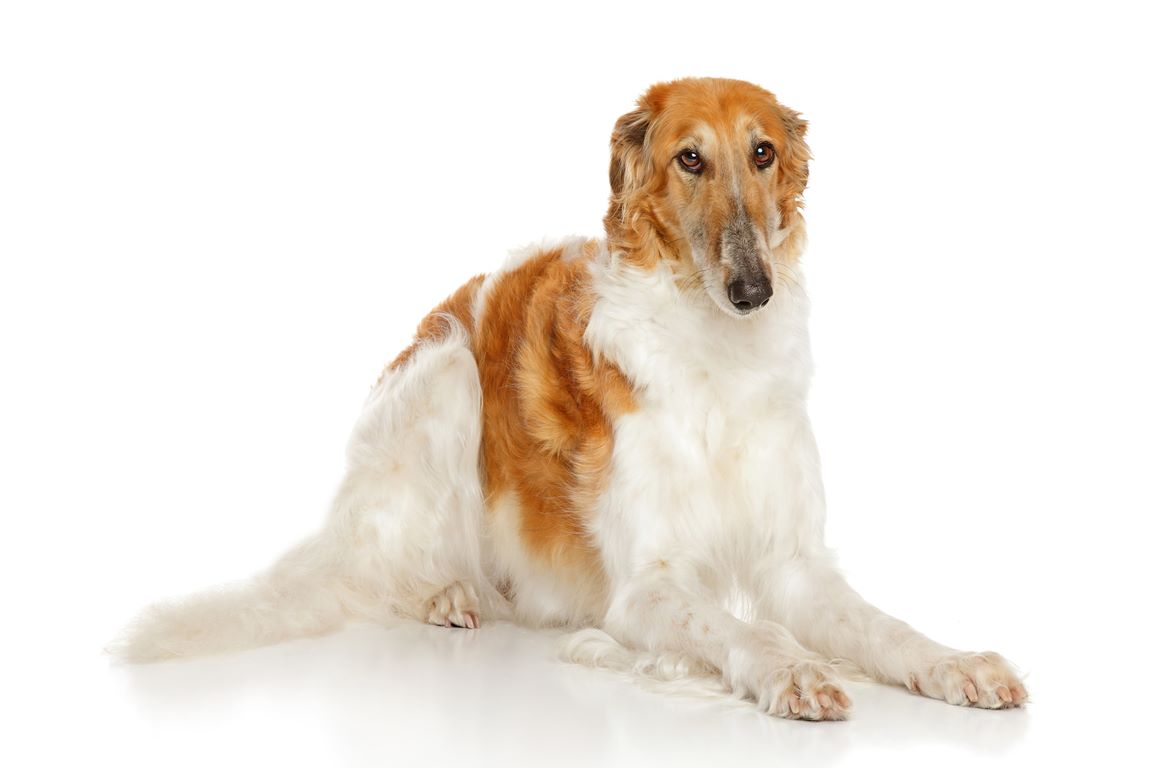Are you considering adding a Borzoi to your family? If you’re looking for a majestic and regal dog that loves nothing more than a good run, then the Borzoi breed might be the perfect fit for you. These graceful dogs are known for their elegant appearance, their affectionate nature, and their incredible speed. While they may not be the most popular breed of dog, they are certainly one of the most beautiful and unique. In this article, we will explore what it takes to care for a Borzoi, and why they might be the perfect pet for you.
Breed Category: Hound
Country of Origin: Russia
Average Size:75-85 cm (at the shoulder)
Average Weight:34-48 kg
Average Life Span: 10-12 years
Grooming Requirements: Moderate to high
Exercise Requirements:Moderate to high
History and Origin
The Borzoi, also known as the Russian Wolfhound, is a breed of sighthound that originated in Russia. The breed was developed by the Russian aristocracy in the 17th century for hunting wolves, foxes, and hares. The Borzoi is a tall and elegant dog with a long, silky coat and a graceful gait. They are known for their speed, agility, and endurance, making them excellent hunting companions.
The Borzoi is believed to have descended from the ancient sighthounds of Central Asia, which were brought to Russia by nomadic tribes. These dogs were then crossed with local breeds, resulting in the development of the Borzoi. The breed was initially used by the Russian nobility for hunting, and owning a Borzoi was a symbol of wealth and status.
The first Borzoi was brought to England in the late 19th century by the Grand Duke Nicholas of Russia. The breed quickly gained popularity among the British aristocracy, and many wealthy families began importing Borzois from Russia. The breed was recognized by the Kennel Club in 1892, and the first Borzoi club was formed in 1892.
During the early 20th century, the Borzoi became a popular show dog in England and America. The breed was featured in many dog shows and exhibitions, and breeders began to focus on developing the breed’s appearance rather than its hunting abilities. This led to the development of a more refined and elegant Borzoi, with a longer and more luxurious coat.
The Borzoi was also used during World War I as a messenger and guard dog. Many Borzois were trained by the Russian army and used to carry messages between troops. The breed’s speed and agility made them ideal for this role, and they were highly valued by the military.
Today, the Borzoi is still used for hunting in some parts of Russia, but it is primarily kept as a companion and show dog. The breed is known for its gentle and affectionate nature, and it makes an excellent family pet for those who have the space and time to devote to its care. The Borzoi is a unique and fascinating breed with a rich history and a bright future.
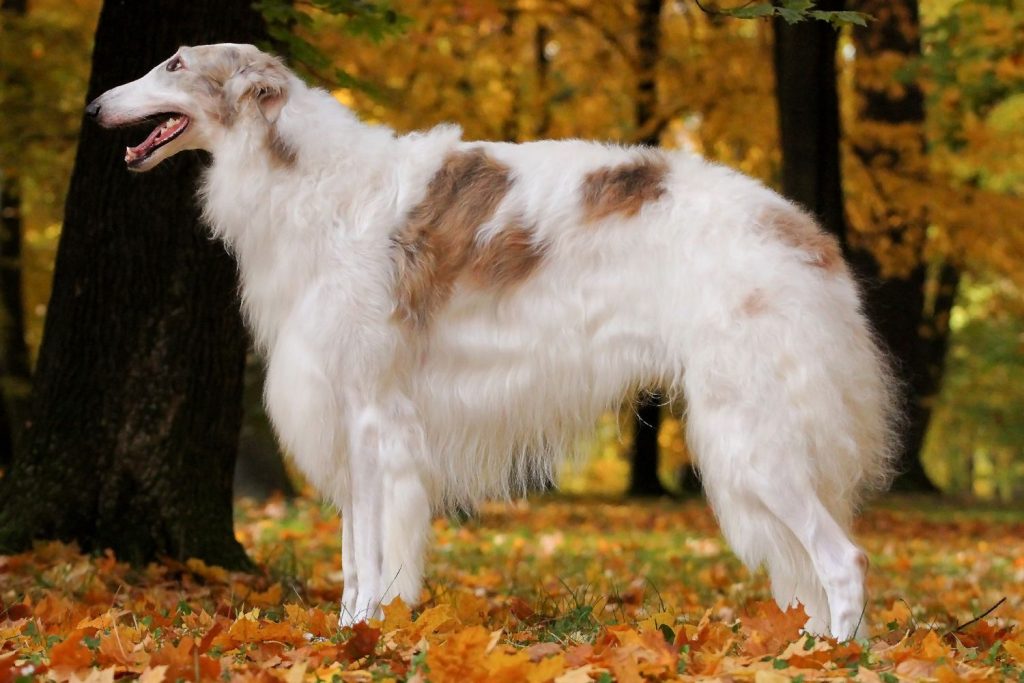
Size and Breed Category
The Borzoi is a large breed of dog that belongs to the sighthound category. They are known for their elegant and graceful appearance, with long and slender bodies that can reach up to 32 inches in height and weigh up to 105 pounds. Their long and narrow heads are complemented by their almond-shaped eyes and long, silky ears that hang close to their necks. The Borzoi’s coat is typically long and silky, with a variety of colors including white, black, gray, and tan. They are known for their speed and agility, making them excellent hunters and competitors in dog sports such as lure coursing and racing.
As a sighthound breed, the Borzoi is known for their exceptional eyesight and ability to spot prey from a distance. They are also known for their independent and aloof personalities, which can make them challenging to train and socialize. However, with proper training and socialization, they can make loyal and affectionate companions. The Borzoi is a breed that requires plenty of exercise and space to run, making them best suited for homes with large yards or access to open spaces. They are not recommended for apartment living or homes with small children or other pets, as their high prey drive can make them prone to chasing and potentially injuring smaller animals.
Fur Length and Colour
The fur of this breed is long and silky, with a slight wave. The hair on the neck and shoulders is particularly long and forms a mane-like appearance. The fur on the tail is also long and feathered, giving it a graceful and elegant look. The Borzoi’s fur comes in a variety of colours, including white, cream, black, grey, and tan. Some Borzois have a combination of these colours, while others have a solid colour. The fur is usually darker on the back and lighter on the chest and legs. The overall effect is a stunning and regal appearance that is sure to turn heads.
The length and texture of the Borzoi’s fur make it well-suited for colder climates. The thick coat provides insulation and protection from the elements, allowing the dog to stay warm and comfortable in even the harshest of conditions. The fur also requires regular grooming to prevent matting and tangling. Brushing the fur daily is recommended to keep it looking healthy and shiny. The Borzoi’s fur is one of its most distinctive features and adds to its overall beauty and elegance.
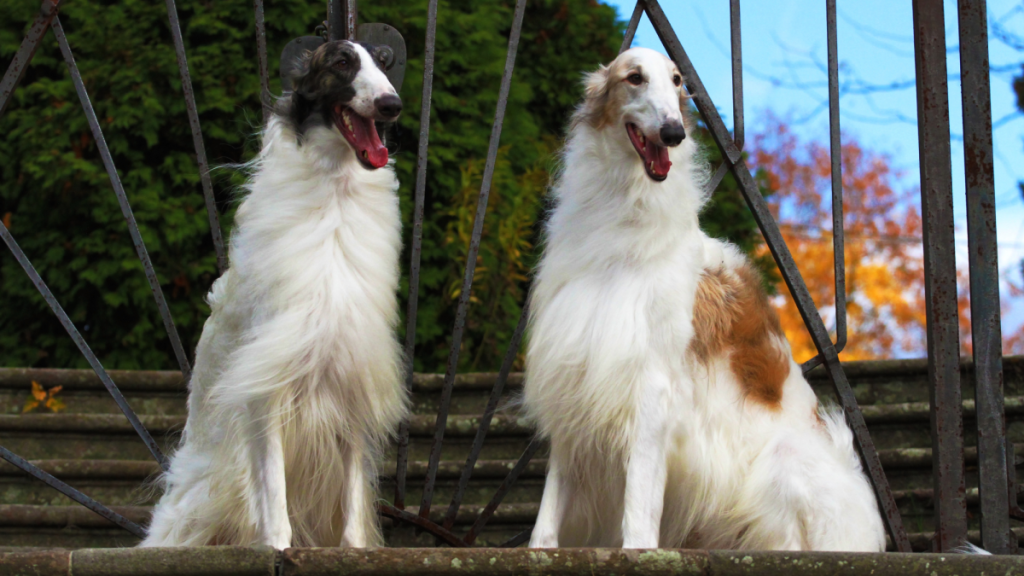
Termperament and Trainability
Borzoi is a breed of dog that is known for its calm and gentle temperament. They are not aggressive and are generally friendly towards people and other animals. However, they can be reserved with strangers and may take some time to warm up to them. Borzois are also independent and can be stubborn at times, which can make training a bit challenging. They require a patient and consistent approach to training, and positive reinforcement techniques work best with them. With proper training and socialization, Borzois can make excellent family pets and are well-suited for apartment living.
Borzois are intelligent dogs and have a good memory. They are quick learners and can pick up new commands and tricks easily. However, they can also be sensitive and may not respond well to harsh training methods. Borzois are known for their high prey drive and may chase after small animals, so it is important to keep them on a leash or in a secure area when outside. They also have a tendency to wander off and explore, so a secure fence is a must for their safety. Overall, Borzois are loyal and affectionate dogs that thrive on human companionship and make great pets for those who are willing to put in the time and effort to train and socialize them properly.
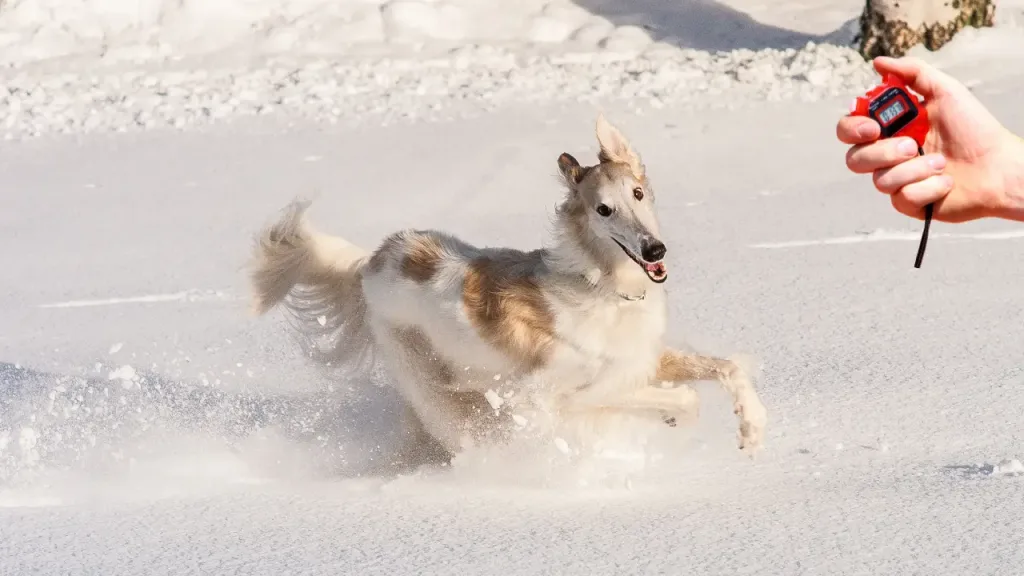
Known Health Conditions
Borzoi, also known as Russian Wolfhounds, are a breed of sighthounds that are known for their elegance and grace. However, they are also prone to certain health conditions that potential owners should be aware of. One of the most common health issues that Borzois face is bloat, which is a life-threatening condition that occurs when the stomach fills with gas and twists on itself. This can cause a blockage in the digestive system and can lead to shock and death if not treated immediately. Other health conditions that Borzois are prone to include heart disease, hip dysplasia, and thyroid problems. It is important for owners to monitor their Borzois’ health closely and to seek veterinary care if any symptoms arise.
Another health condition that Borzois are susceptible to is osteosarcoma, which is a type of bone cancer that is common in large breeds. This cancer can be aggressive and can spread quickly, so early detection is crucial. Borzois are also prone to eye problems such as cataracts and progressive retinal atrophy, which can lead to blindness if left untreated. Additionally, some Borzois may develop allergies or skin conditions that require ongoing treatment. It is important for potential owners to research the breed thoroughly and to be prepared for the potential health issues that may arise. Regular veterinary check-ups and preventative care can help to keep Borzois healthy and happy.
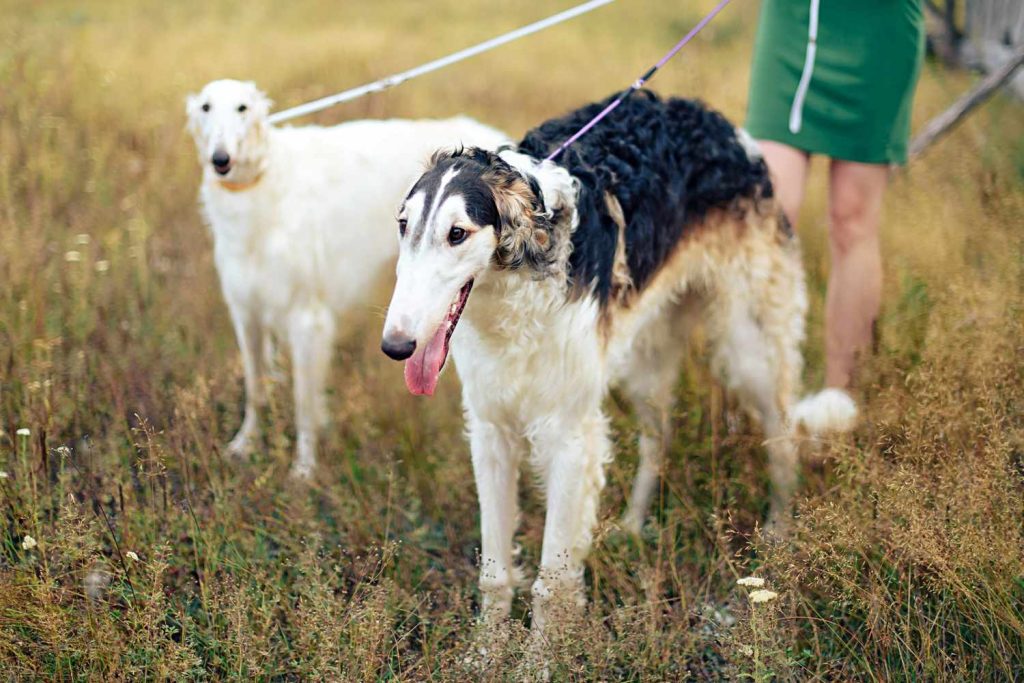
Openness to Strangers
Borzois have a reputation for being aloof towards strangers, but this is not always the case. They are a breed that can be reserved and cautious around new people, but with proper socialization, they can be friendly and welcoming. Borzois are intelligent dogs that can quickly learn to distinguish between friend and foe, and they will often approach strangers with caution until they feel comfortable. Once they have established trust, they can be affectionate and loyal companions.
Borzois are not typically aggressive towards strangers, but they may be wary of unfamiliar people or situations. They are a breed that values their independence and may not always seek out attention from strangers. However, they are not unfriendly dogs and can be quite sociable with those they know well. Borzois are known for their gentle nature and are often good with children and other pets. They are a breed that requires patience and understanding, but with the right approach, they can be a wonderful addition to any household.
Playfulness Level
The Borzoi is a highly playful breed of dog that loves to engage in various activities. They are known for their energetic nature and their love for running and playing. These dogs are always up for a game of fetch or a run around the park, and they are sure to keep their owners entertained with their playful antics. The Borzoi’s playful nature makes them an excellent choice for families with children, as they are always eager to play and interact with their human companions. Whether it’s a game of tug-of-war or a run through the fields, the Borzoi is sure to bring a smile to your face with their playful energy.
In addition to their love for physical activity, the Borzoi is also a highly intelligent breed that enjoys mental stimulation. They are quick learners and love to engage in activities that challenge their minds. Whether it’s a game of hide-and-seek or a puzzle toy, the Borzoi is sure to enjoy any activity that requires them to use their brain. This breed is also highly social and loves to interact with other dogs and people. They are known for their friendly and outgoing nature, and they are sure to make friends wherever they go. Overall, the Borzoi’s playful and intelligent nature makes them a wonderful companion for anyone looking for a fun-loving and engaging pet.
Suitability as a Pet for Children
Borzoi have a gentle and calm temperament, making them a suitable pet for children who are able to handle their size. They are loyal and affectionate towards their family, but can be reserved with strangers. Borzoi require regular exercise, but are not overly energetic, making them a good fit for families who enjoy outdoor activities. They have a long, silky coat that requires regular grooming to maintain its appearance. Overall, Borzoi can make a wonderful addition to a family with children who are able to provide them with the attention and care they need.
Exercise Needs
Borzoi dogs require a significant amount of exercise to maintain their physical and mental health. As a breed that was originally bred for hunting, they have a high energy level and need plenty of opportunities to run and play. A daily walk of at least an hour is recommended, but they will also benefit from additional exercise such as running, hiking, or playing fetch. It is important to note that Borzois have a strong prey drive and should always be kept on a leash or in a securely fenced area to prevent them from chasing after small animals.
In addition to physical exercise, Borzois also require mental stimulation to prevent boredom and destructive behavior. They are intelligent dogs that enjoy learning new tricks and participating in activities such as obedience training or agility courses. Interactive toys and puzzles can also provide mental stimulation and keep them entertained. It is important to provide a variety of activities to prevent them from becoming bored with their routine. Overall, a combination of physical and mental exercise is essential for the health and happiness of Borzoi dogs.
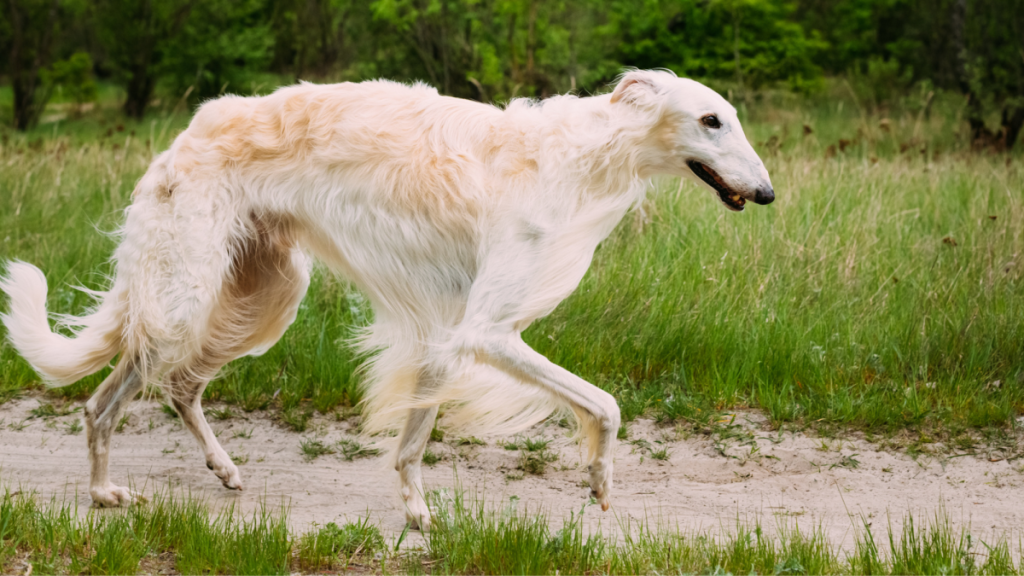
Suitability for a Multi-Pet Family
Borzoi dogs have a reputation for being gentle and calm. They are not known to be aggressive towards other pets, but their prey drive may cause them to chase smaller animals. It is important to socialize Borzois with other pets from a young age to ensure they learn appropriate behavior. Additionally, supervision is recommended when introducing Borzois to new pets.
Housing Requirements
Borzoi dogs require a spacious and comfortable living environment. They need a large, secure garden or yard where they can run and play freely. The garden should be fenced to prevent them from escaping, as Borzois are known to have a strong prey drive and may chase after small animals. Additionally, they require a warm and comfortable indoor space where they can rest and relax. A soft and comfortable bed is essential for their well-being, as they are prone to developing joint problems. It is also important to keep the indoor environment clean and free from any hazards that may harm the Borzoi.
Borzoi dogs have a thick and luxurious coat that requires regular grooming. They shed heavily twice a year, and during this time, they need extra attention to keep their coat healthy and shiny. Regular brushing and bathing are necessary to prevent matting and tangling of their fur. Borzois are also sensitive to extreme temperatures, and they require a well-insulated living space to keep them warm during the winter months. It is important to provide them with fresh water and a balanced diet to maintain their health and well-being. A Borzoi’s living environment should be designed to meet their specific needs and provide them with a comfortable and safe space to thrive.
Summary
Borzoi make great pets for those who have a lot of space and time to dedicate to them. They are active dogs that require regular exercise and mental stimulation. They are also known for their loyalty and affection towards their owners. However, they can be quite independent and stubborn at times, so they require a firm and consistent hand in training. Overall, Borzoi can make wonderful companions for those who are willing to put in the effort to meet their needs.
Borzoi Dog FAQS
Borzois can be stubborn and independent, making them more difficult to train than some other breeds. Consistent and patient training is necessary.
Borzois are not recommended for apartment living due to their large size and need for exercise. A house with a large yard is ideal.
Borzois are generally good with children, but they may be too large and energetic for small children. Supervision is recommended.
Borzois can get along with other pets if socialized properly, but they have a high prey drive and may chase smaller animals.
Borzois are prone to certain health issues, such as hip dysplasia, bloat, and heart problems. Regular vet check-ups are important.
Yes, Borzois shed a lot and require regular grooming to prevent matting and tangling of their long hair.
Borzois have a lifespan of 10-12 years on average, but some can live up to 15 years with proper care.
Borzois need at least 30-60 minutes of exercise per day, such as a long walk or run.
Borzois typically need 2-3 cups of high-quality dog food per day, depending on their size and activity level.
The average height of a Borzoi is 75-85 cm and the average weight is 34-48 kg.
